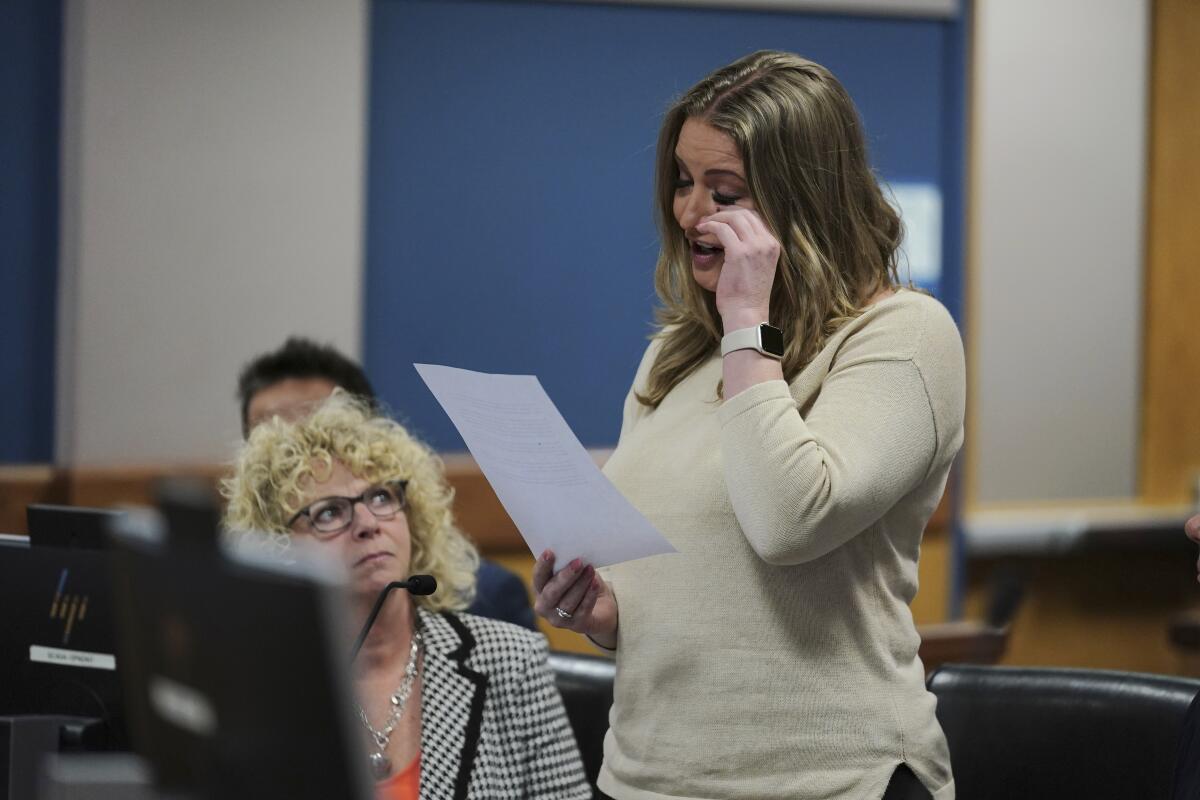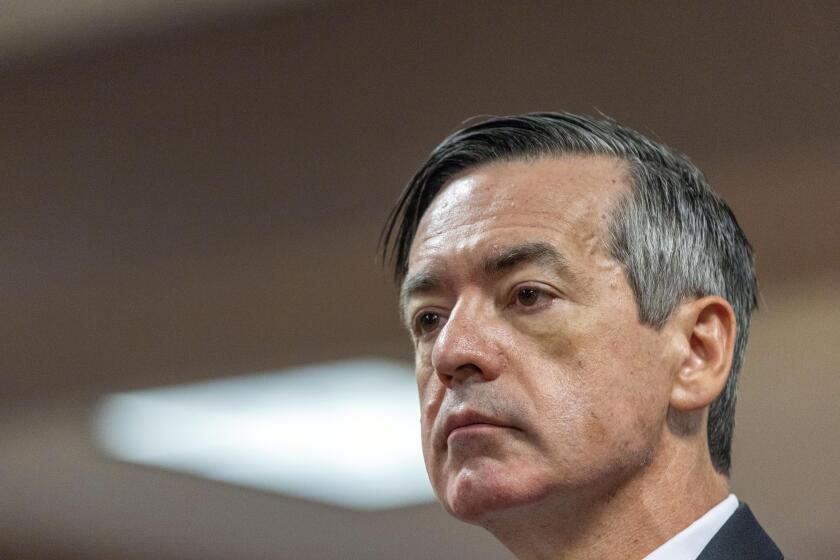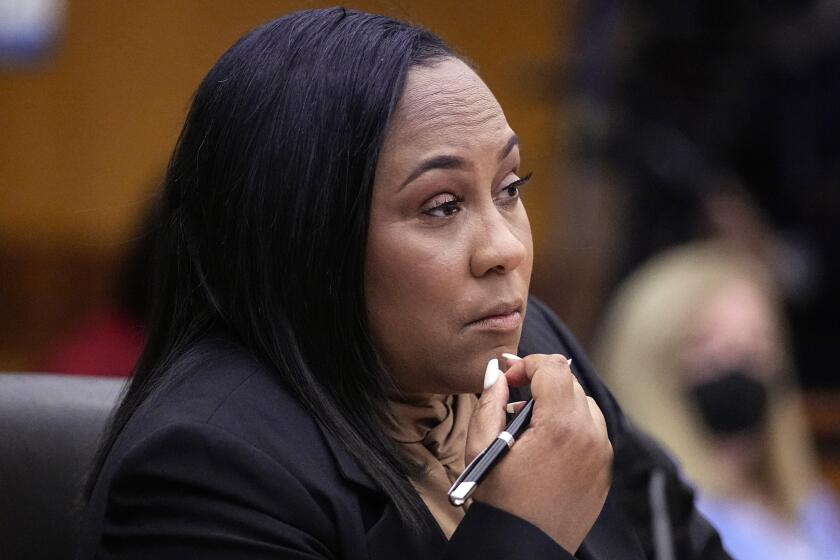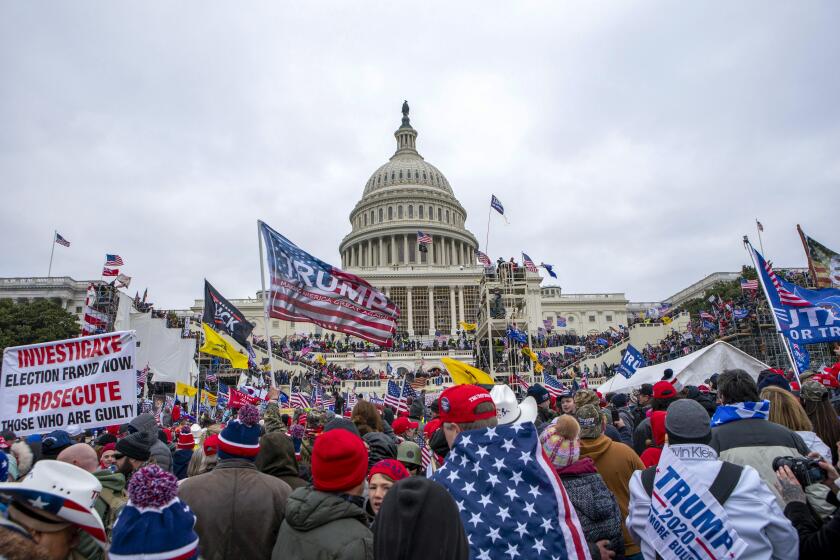Crooked lawyers were crucial to Trump’s Jan. 6 plot. We clearly need to reform the profession

- Share via
Over the last two weeks, Jenna Ellis, Kenneth Chesebro and Sidney Powell, three lawyers central to Donald Trump’s attempt to overturn the 2020 election, pleaded guilty in the Georgia racketeering case against the former president and 18 co-defendants. All admitted significantly lesser crimes than charged and escaped prison time.
Prosecutors may be more interested in Trump himself, but the lenient plea deals fail to comport with the culpability of these and other lawyers in Trump’s plot against the election. Eight attorneys were indicted in the Georgia case, and the federal indictment of Trump in the Jan. 6 plot includes five attorneys as unindicted co-conspirators, unnamed but identifiable as Powell, Chesebro, Rudolph W. Giuliani, John Eastman and Jeffrey Clark.
Lawyers weren’t just involved in Trump’s plot; they devised and enabled it. Lawyers developed the strategies, manufactured a faux constitutional crisis and manipulated legal requirements in the effort to keep Trump in power and give his attempted coup the trappings of legality and legitimacy.
Only lawyers could have performed these services.
The pair could provide damning testimony against the ex-president. Their decisions could also encourage pleas by Rudy Giuliani, John Eastman and others in the Georgia case.
It was clear that Trump had lost the 2020 election by early December of that year. But rather than accurately advise him that there were no further legal options, Chesebro circulated a memo outlining a plan that would circumvent court losses, subvert states’ certified electors and allow Trump to win. What could transform defeat into victory? The lawyer’s craft: manipulation of law and fact.
Tellingly, the attorney co-conspirators have protested that they were just providing legal advice. Before her tearful guilty plea on Tuesday, Ellis asserted that the Georgia indictment was “criminalizing the practice of law.” Chesebro once contended that their advice was simply “the kind of war-gaming that attorneys do.”
Despite these lawyers’ readiness to help Trump overturn the election, the judiciary had proved fairly impervious to his assault of over 60 postelection lawsuits. That wasn’t happenstance. Lawyers are required by the rules of procedure and professional conduct to have a reasonable basis in law and fact for anything they submit in court. They also have a duty of candor to the court requiring them to identify controlling contrary arguments.
But attorneys’ advice to clients has been treated differently. Lawyers violate the rules on advice only if they “counsel a client to engage, or assist a client, in conduct that the lawyer knows is criminal or fraudulent.” That means lawyers can even advise clients to engage in illegal conduct as long as they don’t know it’s criminal or fraudulent. Moreover, lawyers are not required to have a reasonable basis in law and fact for their advice or to identify contrary precedents.
Fulton County Dist. Atty. Fani Willis also charged 18 others, including Rudy Giuliani and John Eastman, taking advantage of the state’s broad RICO statute.
This is particularly problematic in the context of legal advice to government officials regarding the use of their power. Such advice shapes the use and abuse of government authority, which belongs not to officeholders but to the people.
With the exception of Clark, who worked for the Justice Department, the implicated attorneys were private-sector practitioners advising the president. Because they didn’t formally work for the government, they weren’t bound by federal regulation of government attorneys or the entity rule, under which a government lawyer has a duty to the government itself and not merely an official.
Even when advising Trump as to the use of government power, these private attorneys had no duty to anyone but Trump. Consequently, they acted entirely in Trump’s personal interests, bending law and fact to his interests, even against the interests of the government and people.
Take the false elector scheme outlined in Chesebro’s Dec. 6 memo. Eastman, Giuliani and Ellis would all join Chesebro in advising or implementing the plan, with Eastman drafting his own now infamous memos. The plan was to recruit fake electors in seven states and assert that Vice President Mike Pence had the power to refuse to count the supposedly disputed electoral slates.
Special counsel Jack Smith’s investigation yielded an indictment of the former president for his role in events surrounding the Jan. 6, 2021, Capitol riot.
Chesebro emailed detailed instructions for the false electors for each state to make sure they cast their votes in the manner set out by law and provided counterfeit elector certificates to print and sign. The idea that this technical “compliance” with law would somehow render these slates legal would be laughable if it weren’t so dangerous. Chesebro had the phony electors sign certifications that they were “the duly elected and qualified Electors” from those states, which they emphatically were not.
These electoral slates were a machination that the lawyers treated as fact and the basis for their advice that “7 states” had “transmitted dual slates of electors.” In fact, not a single state or authorized representative had created or certified these slates. Eastman nevertheless advised, “The fact that we have multiple slates of electors demonstrates the uncertainty of either,” lending the counterfeit slates the same efficacy as those certified by the states. This advice would have usurped the states’ constitutional power to elect the president and given it to the federal executive branch.
The attorneys’ advice also incorporated the false assertions that the election was stolen or fraudulent. Attorneys promoting a radical scheme to disenfranchise more than 26 million voters had a duty to ensure that their advice was grounded in fact.
Most government officials have at least qualified immunity for actions taken in carrying out their duties. Knowing that officials might not be held accountable for their actions should compel lawyers to act with even greater fidelity to both fact and law when advising government clients. Preposterously, Trump is now asserting immunity for “organizing” the false electors.
If lawyers can manipulate law and fact to justify whatever a government official wants, then official immunities can become a license for oppression, abuse and lawlessness backed by the full weight of government power.
Trump certainly wanted to stay in power at all costs and refused the counsel of many good lawyers and advisors who told him he had lost. But what if Chesebro, Eastman, Ellis and Giuliani had told him the same thing?
Trump would have had nowhere to go. He could not have come up with the false elector scheme on his own. He could have fired off angry tweets, ranted at rallies and thrown dishes and ketchup, but he couldn’t have undermined the electoral process without the lawyers who crafted the plan.
And without the phony electors, none of the efforts to use them to undo Joe Biden’s victory would have occurred: no pressuring of Pence to reject the votes, no rally in Washington to “encourage” him in that direction and no storming of the Capitol.
State bars can begin to respond to these glaring deficiencies by enacting professional conduct rules for lawyers advising government officials, including private lawyers. These rules should specify that lawyers owe a duty to the public to uphold the integrity of our constitutional system and the office being advised. The rules must require lawyers to have a good-faith basis in both law and fact for their advice. And state bars should discipline lawyers who don’t.
Lawyers swear an oath to uphold the Constitution. That oath is meaningless if they fail to protect our system of government from those most likely to subvert it: lawyers themselves.
Margaret Tarkington is a professor of law at Indiana University’s Robert H. McKinney School of Law.
More to Read
A cure for the common opinion
Get thought-provoking perspectives with our weekly newsletter.
You may occasionally receive promotional content from the Los Angeles Times.












